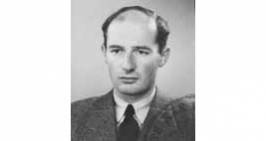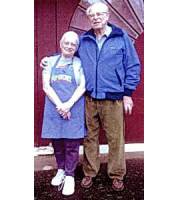 Passport photograph of Raoul Wallenberg. Sweden, June 1944.
Passport photograph of Raoul Wallenberg. Sweden, June 1944.Today, Westwood resident Agnes Adler can tell you that Swedish diplomat Raoul Wallenberg saved thousands of Jews during World War II. But in 1944, when she was 14 years old, she knew nothing about the man.
And yet, she explains, he saved her life.
Adler’s story begins like that of many Jewish children during World War II. Left alone — her father was taken to a work detail and her mother was sent to a ghetto — the teenager decided to fend for herself.
”I didn’t want to go to the ghetto. I had a bad feeling that something would happen there,” said Adler, who was born Agnes Merei in Budapest, Hungary.
Hiding out in abandoned houses after being turned away by friends of her parents, Adler boarded a trolley for the neighborhood of Buda on the edge of the Danube River.
”I saw a nice man who was sitting on the bus reading a newspaper,” she recalled. ”I saw a Swedish flag on his lapel and asked him in German if he had any idea where I could hide.”
Adler said that, at the time, ”every Jew in hiding tried to get to Swedish, Swiss, or Vatican houses where they could be protected.”
Fortunately, the man on the bus — Raoul Wallenberg — was able to help her.
”I knew him for 10 minutes,” she laughed, describing how the man, who appeared to be in his mid-thirties, took out a paper and pencil and wrote down the address of the Swedish office on Baross Street.
”When I told him I was 14, he told me to say I was 16 and an accomplished baby nurse,” said Adler, explaining that while finding a safe house generally cost a lot of money, ”if you worked, they let you stay.”
From Baross Street, Adler was directed to a bunker for refugees.
”I realized this was the gymnasium, a Jewish school,” she said. She had visited the facility years before with her parents, who had considered sending her there.
”They asked, ‘Can you wash dishes?’ and told me I would have to take care of the children there and help in the kitchen. I found out later that the man who had helped me was a very important man.”
According to the U.S. Holocaust Memorial Museum in Washington, D.C., Wallenberg — a successful Swedish businessman who had studied in the United States in the 1930s — was recruited by the U.S. War Refugee Board in 1944 to travel to Hungary. Given status as a diplomat by the Swedish legation, he was to do what he could to help Hungarian Jews.
Wallenberg — who rescued 100,000 Jews from deportation to Nazi concentration camps during the war by issuing passports and creating safe houses — was taken into Russian custody on Jan. 17, 1945. He was never heard from again.
”If I saw him now, I would thank him,” said Adler.
Remaining in the bunker for several months with 150 others, Adler did not leave ”until the Russians came.” When the shooting died down, she went to look at her old home but found that it had been taken over by non-Jews.
The survivor, who is writing a book about her experiences, says she counts herself lucky, since those in the bunker received food on a regular basis. Had she gone to the ghetto, she said, she may well have died of starvation.
Leaving Hungary in 1945 for Israel, she finally arrived there in 1947.
”What should have been a two-month trip took three years” — one of those years spent ”languishing in Cyprus” after being turned back by the British,” she said.
She met her husband David in Israel at the Academy of Arts. Today, at age 80, she has made her mark as an artist, master gardener, and medicinal herbalist. Her husband is an artist as well.
On Aug. 4, Adler will join with 20 other New York-area residents saved by Wallenberg to celebrate the diplomat’s 97th birthday. The reunion, to be held in Manhattan, has been organized by the International Raoul Wallenberg Foundation.
”The reunion is a response to Wallenberg survivors’ wishes and our way to thank them for sharing their inspiring life stories with us,” writes IRWF founder Baruch Tenembaum. Through the project ”Documenting Wallenberg,” the group has compiled interviews ”that give insight into Wallenberg’s courageous life and heroism.”
For more information about the Wallenberg Foundation, visit www.raoulwallenberg.net or e-mail irwf@irwf.org.

